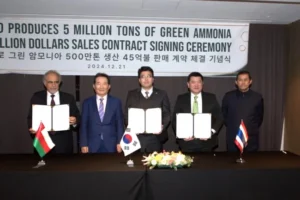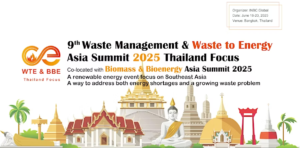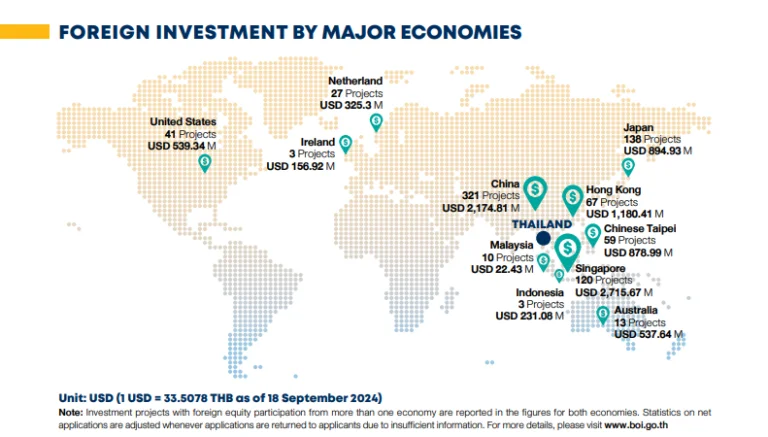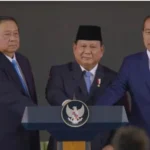Thailand’s National Energy Plan aims to achieve 50% renewable energy by 2037. To meet this target, Thailand projected in 2022 that new renewable energy investments will total approximately THB 779 billion (USD 22 billion) up to 2037. (Thailand Investment Review)
As of 2025, Thailand offers a dynamic landscape for foreign companies seeking joint venture opportunities in the renewable energy sector. The Thai government has implemented policies and incentives to attract foreign investment, particularly in renewable energy projects.

Image source: TIR
Given that Thailand’s renewable energy capacity is projected to comprise over 50% of the planned renewable energy mix by 2040, with solar energy expected to account for over 80% of this mix, the country is focusing on large-scale solar projects.
Solar Power Projects:
Foreign companies can partner with Thai firms to develop solar farms and rooftop solar installations. The Feed-in Tariff (FiT) scheme ensures financial viability for these projects. For large industrial power consumers, maximizing the utilization of solar power is a nobrainer. Solar power today is by far the lowest-cost power source, especially in ASEAN, where it’s cheaper than gas, coal, oil, or hydro. It’s also quick to install and fully decarbonized. (TIR)
Recent Joint Ventures: Banpu Next EcoServe and SPI Energy: In February 2025, Thai company Banpu Next EcoServe Company Limited part of Banpu Public Company Limited with its three core businesses in energy resources (coal and gas); energy generation (conventional and renewable); and energy technology (wind and solar, storage systems, and energy technologies)- partnered with Singapore SPI Energy Investment Pte. Ltd. to establish BNSP Company Limited. This joint venture focuses on investing in and developing rooftop solar projects in Thailand and internationally, reflecting the growing demand for solar energy solutions.
Biomass and Biogas Plants:
Foreign companies can collaborate with Thai firms to develop biomass and biogas plants, turning waste management challenges into energy solutions. Biomass Energy: Thailand’s agricultural sector provides ample biomass resources, making it a viable area for renewable energy projects and foreign investment. Ajinomoto, a Japanese company, set up a cogeneration system at its seasoning plant in northern Thailand, using rice husks as biomass fuel. This system provides both electricity and heat for the facility. Thai Biogas Energy Company (TBEC): While not a foreign company, TBEC has received financing from ICBC Thailand and GuarantCo to build and operate two biogas plants in southern Thailand. These plants clean wastewater from agri-factories and generate biogas for electricity production. TBEC is part of the Asia Biogas Group, seeking foreigner collaboration to expand its operations in the region, including Indonesia and Malaysia.
Energy Storage Systems:
Joint ventures can focus on developing energy storage systems, such as batteries for renewable power systems and electric vehicles. Thailand and Australia: In August 2024, the Commonwealth Scientific and Industrial Research Organisation (CSIRO) and the Electricity Generating Authority of Thailand (EGAT) signed a memorandum of understanding (MoU) to collaborate on energy storage technologies, batteries, and clean hydrogen. This partnership aims to enhance research, training, and knowledge exchange in these critical areas.
Offshore collaboration:
Oman-Korea Green Ammonia Supply: A joint venture between Oman’s Bait Muscat and Korea’s Lupro has secured a long-term contract to supply 5 million tonnes of green ammonia to Thailand, valued at $4.5 billion. This agreement highlights Thailand’s interest in diversifying its renewable energy sources and the potential for foreign partnerships in this domain. Construction of the to build a green ammonia plant in Duqm, on Oman’s east coast will start this year and it intends to start supplying ammonia to Thailand by 2027.

Mohammed bin Hamad Al Rumhi, Oman’s former minister of energy and minerals, with Thai and Korean representatives at the signing of the green ammonia agreement
Foreign companies interested in forming joint ventures in Thailand’s renewable energy sector should engage with local partners and consult the BOI to navigate regulatory frameworks and capitalize on available incentives.

More info 2025 Thailand Focus Summit
Thailand Investment Review publication of late 2024 is an excellent resource to give you a thorough understanding of opportunities and “how-to-practical -advice” from Government policies and incentives, to foreign companies succeeding.
Learn more HERE+












